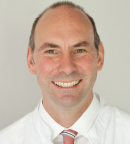
No survival or relapse data are yet shown [in the AGITG trial], and the question is whether histopathologic and clinical response will translate into a survival benefit.— Florian Lordick, MD
Tweet this quote
Florian Lordick, MD, Professor of Oncology and Director of the University Cancer Center in Leipzig, Germany, offered some critical evaluation of the two studies.
AGITG Phase II Trial
For the AGITG’s phase II DOCTOR trial, he emphasized the need to show the impact on survival outcomes for cisplatin/fluorouracil plus docetaxel and radiotherapy. “No survival or relapse data are yet shown, and the question is whether histopathologic and clinical response will translate into a survival benefit,” cautioned Dr. Lordick. “But tailoring multimodality therapy based on individual positron-emission tomography [PET] response, including docetaxel and radiotherapy, looks safe and feasible in esophageal adenocarcinoma,” he acknowledged.
The next steps in researching treatment of esophageal adenocarcinoma, he said, are to determine the “true” roles of radiation, taxanes, and novel compounds and evaluate outcomes of biology- and response-tailored treatments, adding that someday molecular signatures may allow for even greater personalization of treatment.
Chinese Phase III Trial
Dr. Lordick had several criticisms of the Chinese study of neoadjuvant chemoradiotherapy for locally advanced squamous cell carcinoma of the esophagus. He suggested that the median follow-up of about 31 months is too short to predict a survival advantage. He also noted that the dropout rate was high in the neoadjuvant arm, compared with the control arm (17.4% vs 0%), and the R0 resection rate for surgery alone was “exceptionally good” at 91.2%. He also found that the postoperative death rate in both arms to be “exceptionally low” and questioned whether there could be some problem with center-based monitoring or source-data verification.
The next steps in evaluating this approach, he suggested, are to compare trimodality treatment with definitive radiation and chemotherapy and to evaluate the role of salvage surgery. ■
Disclosure: Dr. Lordick reported no potential conflicts of interest.

